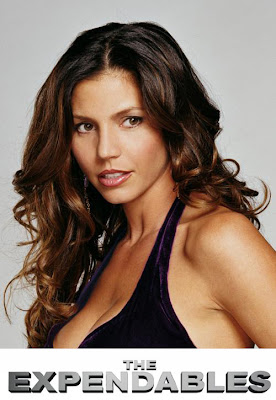Scott Pilgrim is pretty much everywhere right now with the release of the Michael Cera, Edgar Wright film of the same name. A few simple clicks and you can find a handful of helpful reviews to find out if this film is for you. This is part of the reason I don't review every film I see anymore -- it turns me into one voice in a crowd of screaming people. In the case of
Scott Pilgrim, though, I feel it merits a few words. In this review I will focus solely on the graphic novel series from which the story sprung for the major motion picture.
To be clear, I read through the first five parts of the
Scott Pilgrim franchise months and months ago and just finished the last volume about a month ago. Because of this, I'm going to give general impressions of the series instead of specific reviews of each volume. If anything, volume six will get the most coverage because it's the most fresh in my mind, but also because it's my favorite and the most important to the series.

Though this part may be a little redundant,
Scott Pilgrim is about a young, 23 year old whom we join towards the end of his grieving period after getting his heart broken by a mysterious and giant-looming ex girlfriend. In his early twenty-ish haze of confusion and misdirection, Scott is futilely dating a 17 year old high school student in an attempt to feel some dose of comfort even though he is really only finding convenience. It is clear from the first chapter of book one that Scott is not an entirely likable character. He's a bit dumb, he's completely manic often going though the gamut of emotions on one page, he only remembers things in a self-centered manner, and it's hard to believe he cares about anyone but himself. Eventually Scott meets the literal girl of his dreams in Ramona Flowers and through a very extreme set of consequences is forced to take a look at his life and get it together.
Scott Pilgrim is a bit of a cypher of the newly twenty year old generation. He's essentially a mess of conflicting emotions, impulsive gestures, and reactions that very much align with many a person his age. It's this fact that I imagine will decide if people will be able to stomach the insanity contained within the thousand pages of adventures Scott stumbles through. I suppose I should append that note to include the art on display, especially early in the series. A weird mix of quasi-manga, pseudo new-age scrawl the art of
Scott Pilgrim volumes 1 - 4 has a learning curve. Either way, the book succeeds or fails in the mind of the reader in the character of Scott Pilgrim. Personally, I found the character extremely relatable for a number of reasons. Many of Scott's attitudes and more importantly problems are nigh-identical to my own. I also find it very easy to associate with a character so steeped in geek culture while at the same time struggling with the perils of having to grow up not as a possibility, but a necessity.
It is a safe assertion to make that
Scott Pilgrim is largely an allegorical work. Scott is forced to fight in hand-to-hand brawls Ramona's seven evil ex-boyfriends, but it is safe to assume that the fighting is an allegory for coping, for getting over oneself, and for the rigors of falling in love. The movie trailer famously quips that "everyone has baggage", it's just that Ramona's is a much larger and blunt representation of such a concept. Each fight with each successive ex boyfriend fits another snapshot in the ongoing relationship with Scott and Ramona. Matthew Patel, the first of the challengers, is fairly easily dispatched in a show of what I think is perhaps indicative of the early moments of a relationship -- which is to say pretty easily gotten over, but not without its lasting and perhaps reverberating effects. By the time Scott fights Todd Ingram, he's not only dealing with the past of his current girlfriend but he's also having to confront the proverbial mountain that is his most recent ex. It's kung-fu coming of age storytelling that under any other approach may feel well-worn, but because
Scott Pilgrim laces itself heavily with flash and fanservice it finds new life and meaning; assuming the method of delivery is agreeable to the reader.
The most important aspect of the ongoing series of
Scott Pilgrim books is that characters grow as the story continues. Along the way, creator Bryan Lee O'Malley is able to throw curve balls and realistic turns into his story that make it that much easier to associate with the plight of the bombastic characters. This is a prime advantage that the books have over the movie, perhaps understandably so. In the fourth book, Scott finally starts to feel he's getting his life together. He gets a job, faces some personal demons that are obstacles in his path to happiness with Ramona, and he finally gains courage enough to commit to her in a meaningful way. Still things are not as rosey as they seem, as omens of cracks in the relationship are all over from a Dark Scott to a shadowy figure enslaving Ramona in her subconscious and an increasingly bored and distracted demeanor.
In what I believe to be one of the most important moments in the entire series, Book Five showcases everything Scott has done falling apart around him. All of the good things and progress he felt he made end up meaning almost nothing, and everything from friends to job to Ramona end up (in some cases literally) fading away. To be clear, I don't think this is a brilliant turn because I find it enjoyable. I like it only because it's very akin to real life in that sometimes just when you think you're hitting your stride, one very important thing can snap and all the things you've believed you were accomplishing were merely a front for real change. It's powerful,
Empire Strikes Back kind of stuff.
Book Six is aptly titled
Scott Pilgrim's Finest Hour. This title works for a number of reasons. The first and most obvious for me was the new and improved art. O'Malley hired on two art assistants for this volume, and I imagine it was this extra room to breathe that allowed him to really knock this book out of the park on a visual level. Everything has a solid, locked-in appearance. As opposed to the early volumes in which characters were only rough approximations of themselves from page to page, the sixth book explodes with cartoony imagery and amazingly detailed art. This is also the
Finest Hour because the story pays off in a big way in almost every facet. We join Scott after a year of trying and failing to get over Ramona. He's essentially retreated into his own apartment and locked himself from the world. In his grief he makes some rash decisions about what he thinks will best get him over Ramona, and they are each as awkward and uncomfortable as they are in real life.

Eventually after a retreat and a meeting with an old friend, Scott is able to confront his 'dark side' and embrace it -- an action that not only helps him reconcile with himself, but also with everything he has been childishly running away from for five books. The events of the finale are not overwhelmingly important. The important parts revolve around Scott finally growing up and facing down the things he casually ignored. When he finally confronts Gideon Graves, Ramona's own large-looming ex, it's not for her but for Scott himself in a show of getting over his hang-ups. It feels almost like the completion of a cycle for the character. Scott grieves, Scott finds love, Scott loses love thanks to his own selfishness, Scott stumbles and falls, and finally Scott confronts the catalyst for his growth -- both Gideon (the representation of all Scott's insecurities) and Ramona. It's big, it's ridiculous, but it works.
If I had one gripe with the conclusion to this giant story, it would actually be the simplicity of the ending. While in fiction I do believe that it is best to give the audience an ending they can walk away happy with, I find that in reality sometimes the results of Book Six are impossible. I admit that while the reconciliation presented here is quite convenient, it is not without its own admitted uncertainty and hopefulness. If anything it's that feeling that even though it's nicely tied up, it may not work that saves the ending from losing me. At heart, I'm an optimist and I like to believe life can pay off in such a way.
In the end,
Scott Pilgrim is all about growing up and getting over yourself; something with which I am intimately acquainted. It's presented in a hyper-active way that is very much indicative of the problems that prevent many twenty-somethings from growing up, but I think that is almost poetic considering the message of the story. Bryan Lee O'Malley's story speaks to the adolescent in all of us that's struggling to cope with the ever increasing enormity of adult life and adult relationships. I can't speak to that enormity through the eyes of someone aged past this point, but I can imagine there is something inherent in the story that we all acknowledge.














